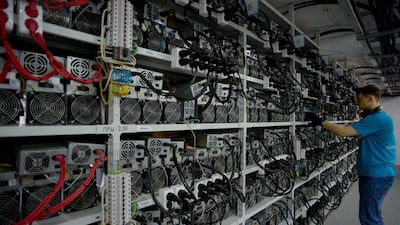With rules for initial coin offerings to be finalised by mid-2019, the UAE is all set to join the ranks of top global financial markets regulating crypto-assets and will be among the leading regional destinations for blockchain related businesses and investments, say experts.
This initiative will add the UAE, the second-biggest Arab economy, to the expanding list of global regulators that have decided to standardise ICOs. Japan’s Financial Services Agency is screening cryptocurrency exchanges before registration, while New York State Department of Financial Services is issuing BitLicence to companies who want to operate in virtual currencies.
"The UAE is perfectly positioned to be a global leader in the ICO space," said Hans Fraikin, chief executive of Libra Project in Abu Dhabi, which is issuing equity tokens in green utility infrastructure.
For Tokenised start-ups using encrypted blockchain technology, the UAE is the most progressive and promising jurisdiction in the world to be based out of right now, Mr Fraikin said.
Abu Dhabi Global Market, one of the fastest growing financial hub in the region, and Dubai International Financial Centre are both keen to implement crypto-exchange legislation in 2019.
"If they succeed as planned, they will be at the forefront of this new burgeoning global securities sector,” Mr Fraikin added.
Except for a couple of smaller jurisdictions such as Malta and Gibraltar, other national regulators and larger jurisdictions are still trying to figure out how to regulate the new crypto-asset industry.
The UAE’s Securities and Commodities Authority (SCA), which supervises and monitors the markets, has approved ICOs as securities and will work with the Abu Dhabi Securities Exchange and Dubai Financial Market to develop trading platforms for ICOs next year.
"Being one of the first jurisdictions looking to regulate ICOs… the UAE is at the forefront of the industry," said Andrea Bonaceto, chief executive of Eterna Capital – a fund management firm in London.
“Owing to the government’s efforts to keep actively modernising its financial infrastructure, the UAE will become a competitive location to attract ICOs and blockchain related investments in 2019.”
However, industry experts said it is very important for the UAE to focus on developing its own community of developers and users to ensure a sustainable future of the sector in the country. Off late, there have been some efforts on that front with development of programmes such as the ConsenSys Academy, whose first class of blockchain developers graduated in Dubai in October last year.
Recent bad run of ICOs is also a reason to worry for the crypto industry.
Significant number of ICOs launched in 2017 and early 2018 are going through a difficult time, said Mr Bonaceto. “While this could be explained by a dramatic downward price correction experienced in 2018, in most circumstances it could have been prevented [to some extent] with a better treasury management.”
ICOs offer a way of crowdfunding to smaller enterprises, other than internet-based platforms. They raised $3.3 billion (Dh12bn) through 412 projects in the first quarter of 2018, according to ICO Rating, a global ratings agency for the cryptocurrency market.
ICOs are an opportunity to finance the small- and medium-sized enterprises and a novel way of crowdfunding that is away from traditional tools, Obaid Al Zaabi, the chief executive of Emirates Securities and Commodities told The National last week.
_______________
Read more:
UAE to finalise initial coin offering regulations in mid-2019, regulatory says
Quicktake: coming soon to the UAE what are initial coin offerings?
Quicktake: Blockchain set to change the public and private sectors
_______________
“ICOs are a global phenomenon… while looking at rapid developments in other domains like artificial intelligence, robotics and transportation - many global players will prefer UAE if there are clear regulations governing ICOs,” said Raghu Yadav, vice president of cryptocurrency start-up MetaBit in Beijing.
Besides fuelling global industry, having more players in this domain will also add value to Abu Dhabi's own blockchain ambitions, Mr Yadav said.
UAE unveiled the Emirates Blockchain Strategy 2021 in April this year, which aims to switch almost 50 per cent of government transactions to blockchain platforms in three years. Dubai Government has its own strategy that aims to help the emirate become the first city in the world to be fully powered by blockchain by 2020.


